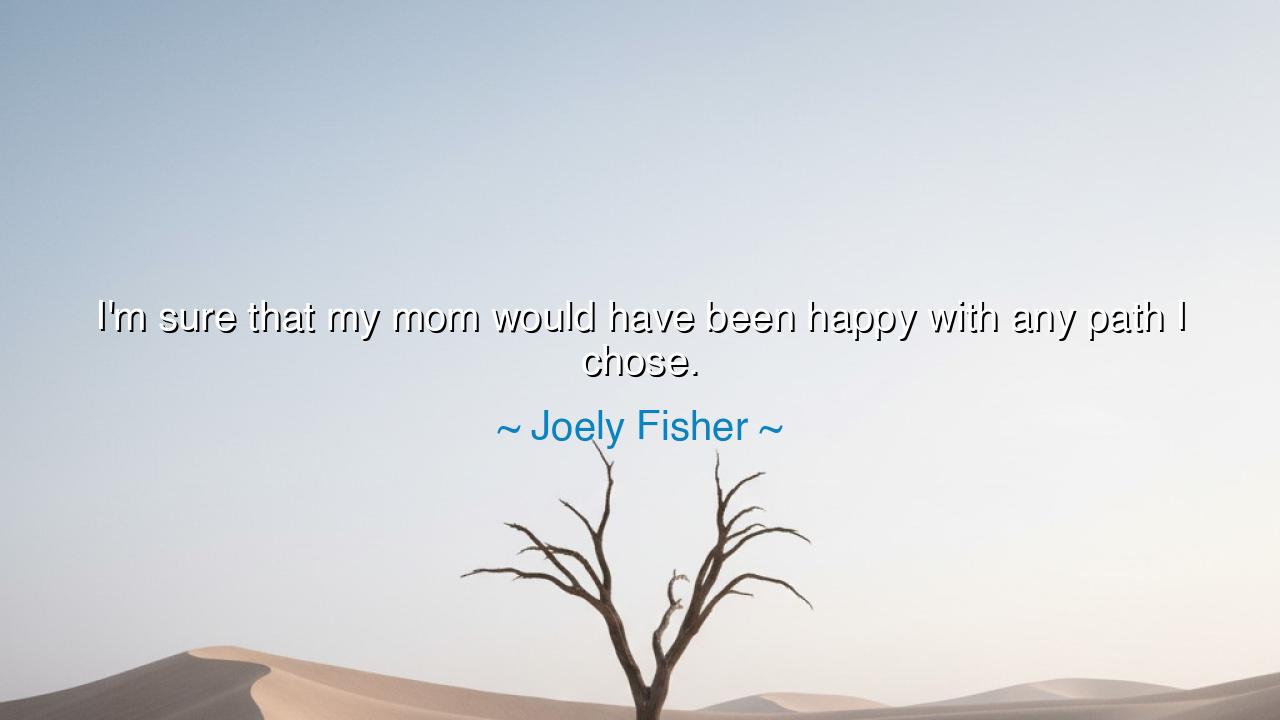
I'm sure that my mom would have been happy with any path I chose.






When Joely Fisher said, “I’m sure that my mom would have been happy with any path I chose,” she was speaking not only of her own life, but of the purest and most enduring form of love — the love that asks for nothing, that demands no conditions, that finds joy not in control but in freedom. Her words, gentle and luminous, are a reflection of what the ancients called agapē — a love that transcends possession, one that delights simply in the being of the other. In this single sentence lies the wisdom of every mother who has ever looked upon her child not as an extension of herself, but as a soul with its own destiny.
The meaning of these words runs deeper than comfort; they speak of acceptance, the kind that heals and liberates. In a world where many are pressured to fulfill the dreams of their parents rather than their own, Fisher’s reflection becomes a hymn to unconditional support. Her mother, the actress Connie Stevens, herself a woman of grace and ambition, understood that the truest gift a parent can give is not direction, but trust — the belief that the child’s inner compass will find its way, even if the road winds differently than one might have imagined. To say, “She would have been happy with any path I chose,” is to declare that love’s greatest triumph is freedom.
The origin of this quote lies in Joely Fisher’s reflections on her upbringing and her relationship with her mother. Born into a family of artists and performers, she might have felt the invisible weight of legacy — the expectation to follow in familiar footsteps. Yet her mother’s love, as she recalls, was not the kind that shackled her to tradition, but the kind that empowered her to choose for herself. Whether she had become an actress, a teacher, or a wanderer of distant lands, Fisher knew that her mother’s heart would have been equally proud, for it is not success that defines parental joy, but the happiness of the child.
This sentiment echoes through history. Consider the story of Pericles and his mother, Agariste. When he was a boy, she saw in him great potential, but she never dictated his destiny. Instead, she nurtured his mind, allowing curiosity to be his guide. Pericles went on to become one of the most enlightened leaders of Athens, but his greatness began not with ambition imposed from above, but with freedom granted from love. Like Fisher’s mother, Agariste knew that one who is trusted to find their own way will grow not only in strength, but in wisdom.
There is also a spiritual dimension to Fisher’s words. The ancients taught that love without attachment is the highest form of love — that to wish happiness for another, even if it leads them far from you, is the essence of divine compassion. Many parents love deeply, but few love freely. To love freely is to release fear, to say, “Go where your heart leads, and I will rejoice in your becoming.” In Fisher’s reflection, we see the echo of that higher love — a love that honors individuality, that recognizes every soul as a traveler on its own sacred path.
Yet her words also carry an undertone of longing, the quiet ache of remembrance. To say, “My mom would have been happy,” suggests loss — that the voice of affirmation now lives in memory rather than presence. And yet, memory itself becomes sacred, for love that once guided in life now blesses in spirit. Like the stars that shine even after their fires have gone out, a mother’s love continues to illuminate long after she has departed. Fisher’s faith that her mother would have accepted any choice becomes a way of keeping that light alive — of knowing that even from beyond, her mother’s heart still whispers, “I am proud of you.”
So, my listener, take from Joely Fisher’s wisdom this lesson: true love liberates, never confines. If you are a parent, let your children’s paths unfold like rivers — sometimes winding, sometimes fierce, but always moving toward their own ocean. Do not shape their journey; support their voyage. And if you are a child, walk your road with courage, knowing that love does not require imitation to be honored. The greatest way to repay the love that raised you is to live authentically, to flourish in your truth.
For in the end, Fisher’s words remind us that the love of a mother is not measured in how closely her child follows her footsteps, but in how freely that child dances in the light of their own. It is the love that watches the horizon without fear, the love that says, “Go, and be who you are meant to be — for that alone is enough.”






AAdministratorAdministrator
Welcome, honored guests. Please leave a comment, we will respond soon